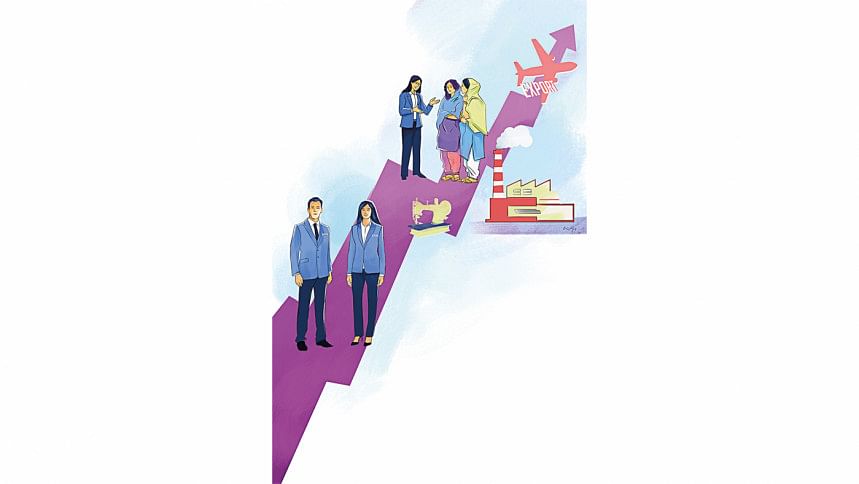Boosting women-led SMEs through financing

"To overcome poverty, I started my embroidery business with my savings. Due to a lack of funding, it was initially difficult to make a profit. Later, I took a loan from a bank," shares Sultana Afroze, founder of Sultana Embroidery, reflecting on the early stages of her SME journey. Starting with just six manual machines in 2005, Sultana later added four computerized machines, delivering products to renowned names like Amanat Shah Lungi, BK Saree, Nikhut Print, and others.
According to the Asia Foundation's Annual Report 2022, 46% of SMEs received loans to expand their business, with 91% reporting increased income. Despite success stories like Sultana's, where women-driven initiatives contribute significantly to family and national economies, the number of women-led SMEs remains insufficient.
The Economic Census of 2013 reported that 7.2% of all enterprises in Bangladesh were led by women, with 99% of these being SMEs. Dr. Md. Masudur Rahman, Chairperson of the SME Foundation, highlighted that no economic census has been conducted since then, estimating the current percentage to range between 10 to 12%.
"Women face various social and familial challenges simply because they are women. These issues cannot be resolved overnight. However, creating opportunities for women and fostering a business-friendly environment will motivate many women to venture into business," said Dr. Nazneen Ahmed, Senior Fellow at BIDS.
"Women face various social and familial challenges simply because they are women. These issues cannot be resolved overnight. However, creating opportunities for women and fostering a business-friendly environment will motivate many women to venture into business," said Dr. Nazneen Ahmed, Senior Fellow at BIDS.
Bangladesh Bank has introduced several initiatives to enhance financing for women-led businesses. In 2023, the 'Small Enterprise Refinance Scheme' was renamed the 'Small Enterprise Refinance Scheme for Women Entrepreneurs,' exclusively dedicated to women. According to its circular published in July 2023, the central bank will provide incentive facilities to banks and financial institutions at a rate of 1%. This aims to encourage timely adjustment, collection, and repayment of loans disbursed under the Refinancing Scheme for Women Entrepreneurs in the SME sector, capped at a maximum interest rate of 5%.
Besides complying with BB's directives, banks and financial institutions have developed their own products and approaches to support women entrepreneurs.
"We do not focus solely on metropolitan areas but also on semi-urban and rural regions. We provide incentives to our staff to encourage them to extend loans to women. As of April, the percentage of loans granted to women-led SMEs stands at 17 percent. In contrast, loan rates in the informal sector are much higher, ranging from 30 to 35 percent, while NGO loans average around 24 percent," said Kamrul Mehedi, Head of SME, Small & Microfinance & Agent Banking of City Bank.
Midland Bank has been actively boosting the SME sector through campaigns that support women entrepreneurs. "Any woman entrepreneur who owns at least 51% share in a joint venture or company is eligible for women-centric loans," said Md. Ahsan Jamil Hossain, Head of SMEs and Agriculture. The MDB Nari Uddog, a tailor-made loan product for women-led businesses including micro, cottage, small, and medium enterprises, as well as emerging corporates, has been promoting women entrepreneurs since 2014.
"Creating income-generating opportunities for women is crucial for empowering women and reducing gender inequality in society, aligned with the SDG goals. We offer collateral-free loan products and special interest-bearing deposit products," said Md. Khalid Mahmood Khan, Additional Managing Director & CBO of Mutual Trust Bank (MTB). 'MTB Angona,' a dedicated wing to cater to all banking needs of women, has ensured that the bank's total exposure to women-led businesses exceeds 15% of its total CMSME portfolio.
"Assessing sales performance meticulously is crucial to tailor loan offerings accordingly," said Syed Abdul Momen, DMD and Head of SME Banking at BRAC Bank. The bank's 'TARA' is a dedicated banking service designed for the women's segment, offering conveniences such as lower interest rates and relaxed regulatory requirements. This includes reducing the required years of experience from three to one year, as well as simplifying tax return obligations and trade license criteria for women entrepreneurs.
"Despite significant achievements in recent decades, women entrepreneurs still face formidable obstacles in running their businesses. To help alleviate some of these challenges, Dhaka Bank aims to support their initiatives and create better business opportunities," said Md. Mahbubur Rahman Palash, Executive Vice President and Head of MSME and Emerging Business Division at Dhaka Bank. To enhance profitability and sustainability for female-led businesses, the 'Oditiya Loan', an EMI-based/structured repayment method, facilitates women entrepreneurs in acquiring current business assets or fixed assets.
Distribution channels play a crucial role in reaching the most remote and deprived communities for SME loans. "Maintaining a large network involves costs such as manpower and accommodation, which often increase expenses and pose challenges for many banks to manage," said Md. Kamruzzaman Khan, Executive Vice President and Head of SME at LankaBangla Finance. Utilizing mobile lending officers, the NBFI strives to reach women entrepreneurs in hard-to-reach areas. LankaBangla's 'Shikha' initiative is designed to support and motivate women entrepreneurs through a range of diverse products and services.
Despite female-friendly approaches by the central bank, scheduled banks, and NBFIs, women entrepreneurs report facing neglect. "Although accessing formal financial support is crucial for business growth, female entrepreneurs often struggle to obtain loans due to the extensive paperwork required by banks, lack of financial knowledge, and gaps in financial resources," said Waresa Khanam Prity, President of Her-e-Tread, a platform for female entrepreneurs.
"Despite operating businesses for four or five years, many women lack essential documents such as trade licenses, Taxpayer Identification Numbers (TINs), and bank transaction records, which makes it difficult for them to qualify for loans. Addressing these gaps and fostering a conducive environment between banks and loan applicants can help mitigate these challenges," said Izlal Hossain, Program Manager of MSME Intervention at the Asia Foundation.
"Banks' financial products should cater to the seasonal, immediate financial needs to ensure capital flow, enabling entrepreneurs to expand their businesses," said Kashmiri Sultana, owner of Chaturbhuj.
Women-led businesses are expanding using different platforms such as e-commerce and f-commerce. According to the Asia Foundation's annual report, 67% of women-led SMEs have benefited from e-commerce platforms as alternative sales channels. Waresa of Her-e-Tread emphasised that regulatory amendments to streamline the trade license acquisition process, including an updated list of business types and provisions for adding business areas, could alleviate paperwork challenges for online women-led businesses.
Increasing women's access to formal financing channels is crucial. Without adequate policies and support, achieving comprehensive development will be challenging, highlighted Dr. Md. Masudur Rahman, Chairperson of the SME Foundation.
In the evolving market landscape, women entrepreneurs in both rural and urban areas face obstacles due to various capacity-building challenges, including a lack of knowledge of business regulations, insufficient startup capital, inadequate skills training, and limited support for marketing their products. "It is important to equip them with sufficient knowledge in these areas so they can secure and effectively utilize necessary finances," said Dr. Masudur Rahman of the SME Foundation.

 For all latest news, follow The Daily Star's Google News channel.
For all latest news, follow The Daily Star's Google News channel. 



Comments